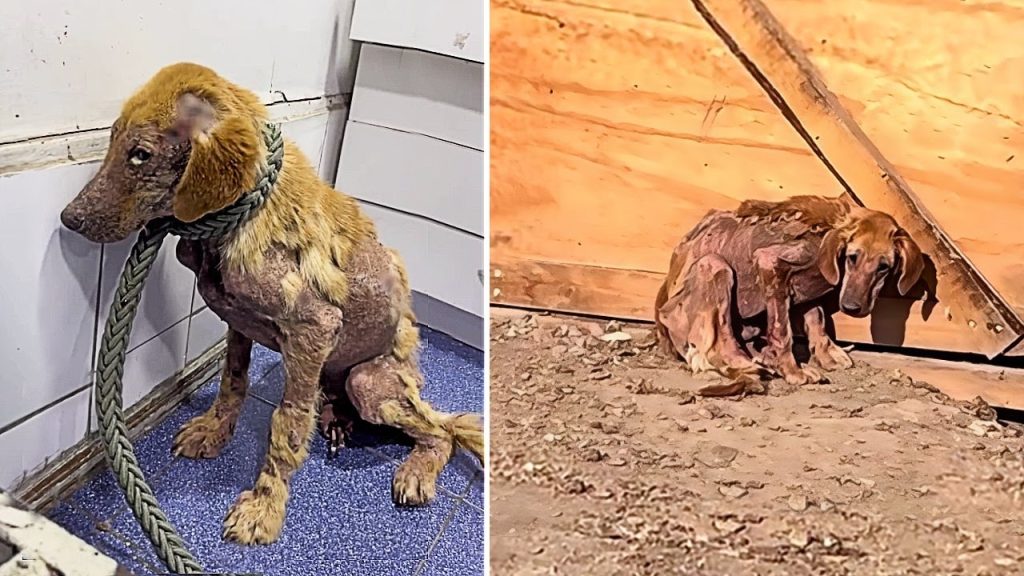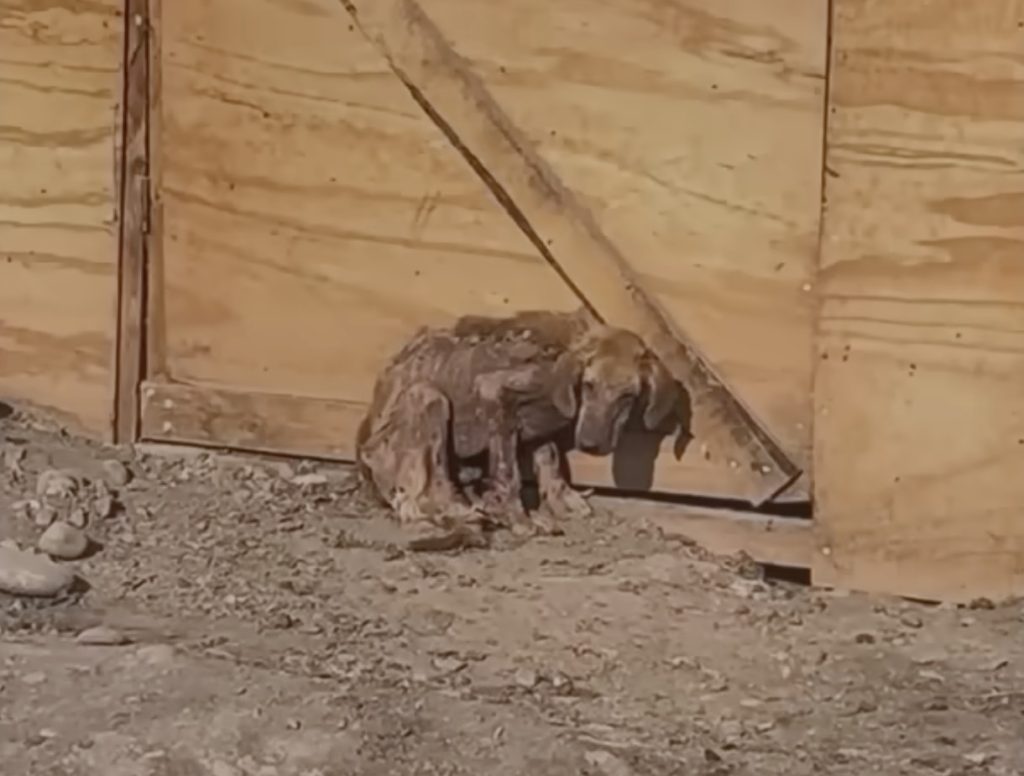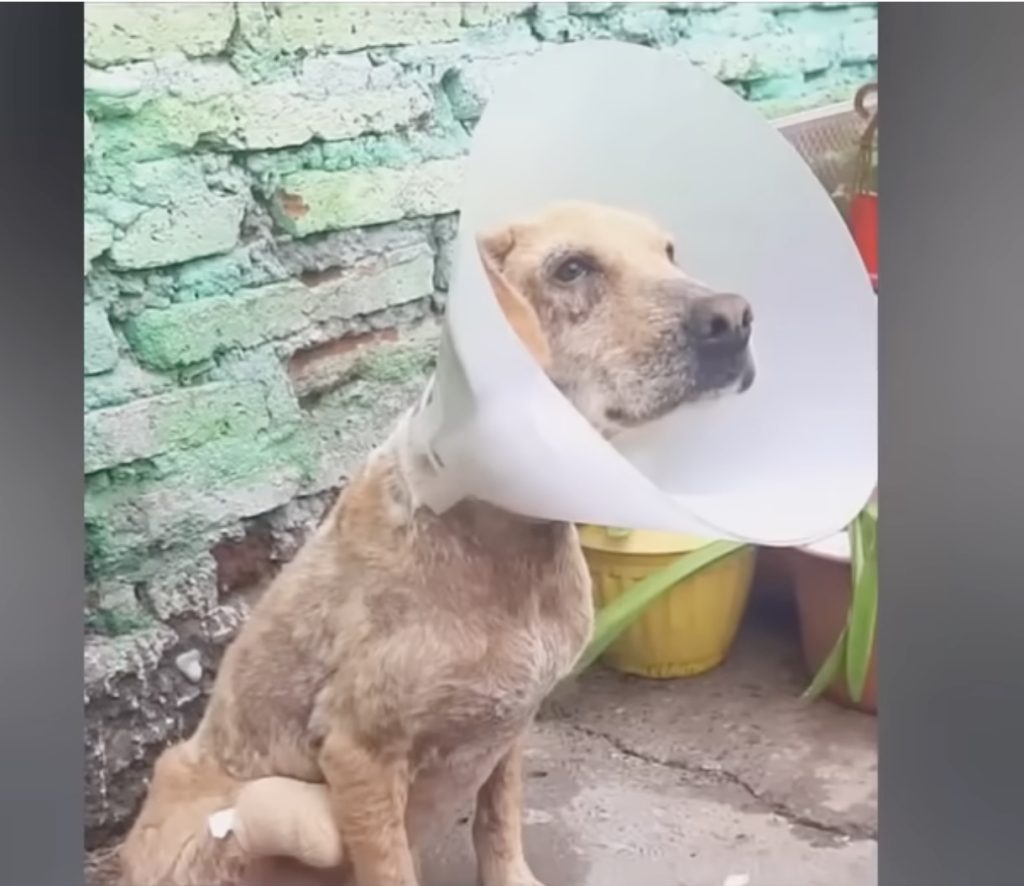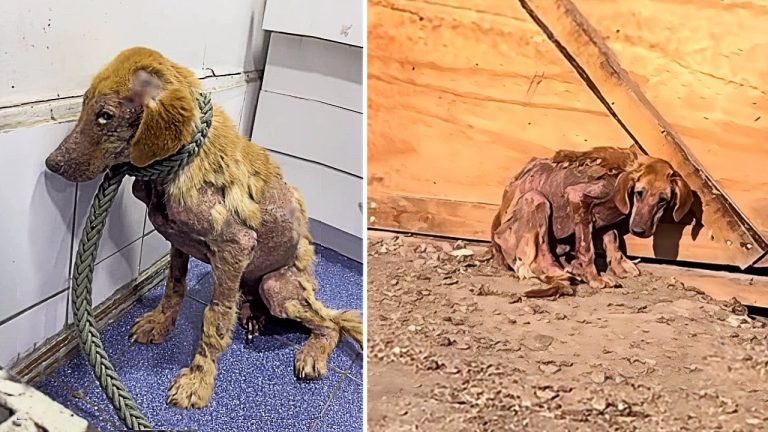For a long stretch of lonely moons, he wandered the earth unseen, forgotten, and unwanted. Once someone’s companion, he had been cast aside by the very hands that were meant to care for him. The seasons passed, and hunger became his only constant. His frail body carried the story of his pain — deep scars etched into his skin, patches where fur no longer grew, and one leg so terribly injured that it had been stripped nearly bare. Each step was agony, yet he kept moving, because to stop meant surrender. He roamed the edges of villages, moving like a shadow through the tall grass and empty fields, searching for scraps, warmth, or simply a reason to keep going. People saw him only as a threat — something wild, something diseased. When he approached in desperation, hoping for a kind glance or a piece of bread, he was met with stones, shouts, and fear. They believed he would harm their crops, their animals, or bring bad luck. And so they drove him away, again and again, until one day he stumbled into a cruel trap meant for something else.

Caught, alone, and in agony, his wounds deepened. There was no one to tend to them. Infection crept in silently, turning pain into torment. Days turned to nights, and his body weakened as the damage spread. He was losing not just strength but the will to live. His fur fell away from illness, his skin cracked and burned with sores. The cruel bite of hunger hollowed his stomach, yet still, he pressed on. He had become something between life and death — a moving ghost of suffering that no one wanted to see.
But one morning, when the sun stretched its golden arms over the horizon, his path changed. A small group of people with gentle eyes and soft voices spotted him lying near a dry patch of earth. At first, he tried to crawl away, his trembling body refusing to trust. To him, every human meant harm. But his strength was gone, and his legs could no longer carry him. The people approached carefully, speaking words he could not understand but somehow felt. Their hands were not cruel; they were calm, deliberate, kind. They lifted him from the dirt, and for the first time in what felt like forever, he was carried instead of chased. They named him Bruno.
At the place they took him — a quiet lodge filled with warmth and care — those who tended to injured souls looked upon him with heartbreak. His wounds were not from days or even weeks of neglect, but from seasons of suffering. His leg was too far gone to save; the damage had reached the bone. Still, they worked with patience. They cleaned each wound, removing the dirt and decay, washed away the reminders of pain, and wrapped him gently in soft bandages. For the first time in many moons, Bruno could sleep without fear. He didn’t understand what was happening, but something inside him softened — a small flicker of trust, fragile but real.
The healing took time. His body had to relearn what it meant to live without constant pain. The surgery came and went; his leg was removed so that his body could heal fully. The moment he awoke, the ache that had haunted him for so long was replaced by something new — peace. Slowly, his eyes began to reflect that peace too. His rescuers saw it: a tiny spark of hope that had survived against all odds.
When his body grew stronger, Bruno was taken to a foster home — a place filled with light, gentle voices, and soft blankets. The woman who took him in had a heart as warm as her smile. She spoke to him as though he were family, not a creature to be pitied. Each day, she fed him, bathed him, and helped him stand. She introduced him to simple joys he had long forgotten — a cozy bed, the smell of freshly cooked food, the sound of laughter. She placed a bright-colored ball near him one afternoon, and to her surprise, he nudged it back. It was small, almost hesitant, but it was play. It was life.
Day by day, Bruno transformed. The haunted look in his eyes began to fade, replaced by curiosity and something that looked like gratitude. He learned to balance on three legs, moving more confidently each morning. The world that had once been cruel now seemed gentle in his new home. He discovered that not all hands were hurtful, that kindness could heal wounds deeper than the skin.
Sometimes, in the quiet evenings, Bruno would sit near the window, his gaze drifting beyond the glass. Perhaps he remembered the days of hunger and loneliness, perhaps not. But now, when his caretaker called his name, his tail would move, slow at first, then faster, until it became a joyful wag. He had found safety. He had found love.

Bruno’s story is not just one of survival — it is a lesson written in the language of the heart. It reminds us that even the most broken beings carry within them a spark waiting to be reignited. What he endured was unimaginable, yet through kindness, he found renewal. Through compassion, he learned that life could be more than pain.
For every creature like Bruno, there are still others wandering unseen, waiting for that same miracle — a hand that reaches out instead of pushing away, a heart that chooses empathy over fear. His journey from abandonment to belonging teaches us that healing doesn’t only happen in the body. It happens when trust returns, when a soul once lost learns to hope again.
Today, Bruno runs — not far, not fast, but with joy that fills every step. His fur has grown thick and soft again, his eyes bright with a quiet confidence. He greets his caretakers with gentle affection, resting his head against their knees as if to say thank you without words. His scars remain, but they are no longer marks of suffering. They are proof of survival, reminders of a truth that should never be forgotten: love can rebuild what life has broken.

Bruno’s transformation, from the filth of neglect to the warmth of love, stands as a beacon of what compassion can do. His journey tells us that no soul is too far gone to be saved, no life too broken to heal. When given a chance, even the most fragile heart can shine again — brighter than before, stronger because it was once shattered and then mended by kindness.
